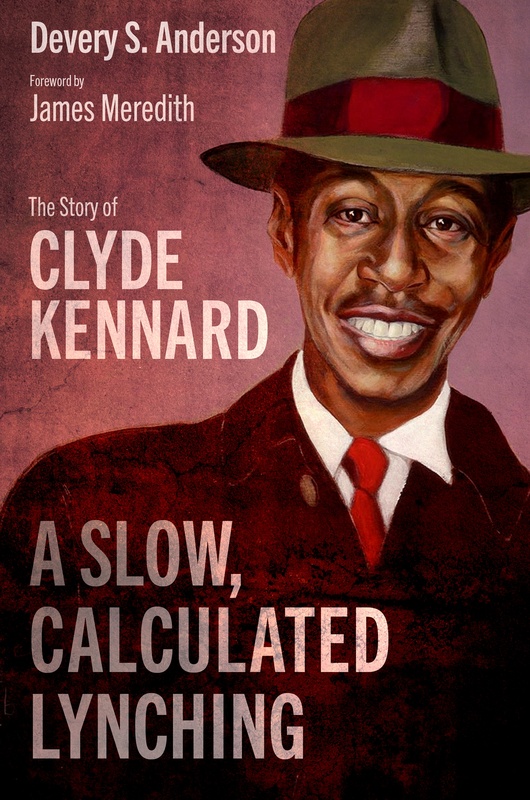
A Slow, Calculated Lynching
The Story of Clyde Kennard
In the years following Brown v. Board of Education, countless Black citizens endured violent resistance and even death while fighting for their constitutional rights. One of those citizens, Clyde Kennard (1927–1963), a Korean War veteran and civil rights leader from Hattiesburg, Mississippi, attempted repeatedly to enroll at the all-white Mississippi Southern College—now the University of Southern Mississippi—in the late 1950s.
In A Slow, Calculated Lynching: The Story of Clyde Kennard, Devery S. Anderson tells the story of a man who paid the ultimate price for trying to attend a white college during Jim Crow. Rather than facing conventional vigilantes, he stood opposed to the governor, the Mississippi State Sovereignty Commission, and other high-ranking entities willing to stop at nothing to deny his dreams. In this comprehensive and extensively researched biography, Anderson examines the relentless subterfuge against Kennard, including the cruelly successful attempts to frame him—once for a misdemeanor and then for a felony. This second conviction resulted in a sentence of seven years hard labor at Mississippi State Penitentiary, forever disqualifying him from attending a state-sponsored school. While imprisoned, he developed cancer, was denied care, then sadly died six months after the governor commuted his sentence. In this prolonged lynching, Clyde Kennard was robbed of his ambitions and ultimately his life, but his final days and legacy reject the notion that he was powerless.
Anderson highlights the resolve of friends and fellow activists to posthumously restore his name. Those who fought against him, and later for him, link a story of betrayal and redemption, chronicling the worst and best in southern race relations. The redemption was not only a symbolic one for Kennard but proved healing for the entire state. He was gone, but countless others still benefit from Kennard’s legacy and the biracial, bipartisan effort he inspired.
This meticulously researched book reveals how Kennard was wrongly imprisoned in Mississippi’s infamous Parchman prison farm, where he was denied proper medical care despite a cancer diagnosis. It reveals the chilling tactics the state of Mississippi employed to preserve white supremacy.
A Slow, Calculated Lynching is Devery S. Anderson’s biography of Clyde Kennard, whose desire for an education and opportunities led to his gradual martyrdom. . . . Eventually, Mississippi honored Kennard’s legacy; [this book] makes a case for his broader recognition as an earnest, tenacious man who advocated for justice.
Learning about Kennard—apparently a sweet man, brightand able—adds dimension to his legendwhile underscoring the despicabledepths to which defenders of segregationdescended, desperate to defeat inevitability. . . . A Slow, Calculated Lynching: The Story of Clyde Kennard is essential reading for individuals inhabiting the Pine Belt who seek to understand their local history, Mississippians desiring to fathom our collective past and students of the Civil Rights Movement.
[The] most comprehensive narrative to date
For Anderson, Kennard stands for those who were beaten down before they could see the mountaintop, following a newer school of civil rights histories being written from the bottom up, rather than as the traditional top-down, leader-driven histories. Additionally, much like the work of Danielle L. McGuire, Anderson’s work highlights a small spark that led to a greater movement and makes connections from one man’s stand in Hattiesburg, Mississippi, to the larger civil rights movement.
Clyde Kennard is known to scholars of the civil rights movement, but his name is not familiar to most Americans. It needs to be. He paved the way for many, and some, like me, learned from his mistakes as well as his perseverance. My hope is that this book goes a long way in finally giving Clyde Kennard his due.
Clyde Kennard was a dreamer and optimist whose courageous struggle to attend his hometown university was halted by actors who were far more committed to racial segregation and white power than any possible measure of merit or justice. Devery S. Anderson has finally given us the Clyde Kennard book that we deserve, well-researched and sympathetic, with a touch of righteous indignation.
A Slow, Calculated Lynching: The Story of Clyde Kennard makes a vital and timely contribution to our understanding of how the courage of everyday people can wield immense influence. Through the life of war veteran and farmer Clyde Kennard, readers will vividly see how the sacrifices of a few can change lives for the many.
Devery S. Anderson’s Emmett Till: The Murder That Shocked the World and Propelled the Civil Rights Movement was the basis for the ABC limited television series Women of the Movement. Anderson is editor or coeditor of four books related to Mormons and the West, two of which won the Steven F. Christensen Award for Best Documentary from the Mormon History Association in 2006.





